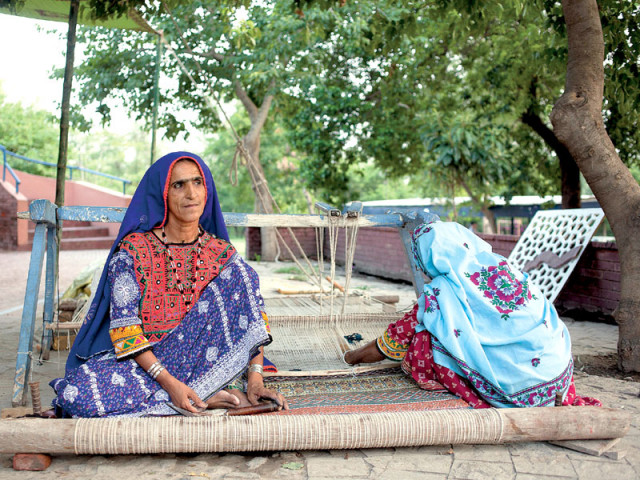Artisans in town: ‘This is our tradition, we will do this till the end of time’
Two families discuss their love for the craft of dari making.

As people who probably never had the luxury of sitting in an air-conditioned room, Amanullah and his wife Siyani Khatoon seemed content and at peace with the Islamabad heat.
They sat basking in the setting summer sun, next to their large wooden frame that holds long threads together. They travel every year from Khairpur in Sindh to set up a stall of daris (a local form of carpet) at Lok Virsa. Every year, they say, they learn something new about the craft that has been handed down to them by their forefathers.
“This large wooden frame is called a Chakri, the white thread is tightly wound across and this kangi (comb) weaves the colourful thread and forms pattern,” Siyani explained as she went over the loom, “Right now we are using eight pedals, which we push with our feet that moves the whole thing into motion.”
The craft is something like a family heritage to them, even if this may not be a profitable business, given they have no proper retail outlet to sell their daris.
But the couple insists that it’s something they have to carry on doing. “I have been doing this since childhood. So you can figure out how long it’s been, I guess I must be 50 years old by now,” Amanullah grinned, as he scratched his head trying to count his years in head.
Their children, two sons and two daughters, too will continue the business, they say.
“All of them know the craft. We could only educate one daughter and one son, but we are happy because we know they are interested in carrying on the family business,” said Amanullah.
Nearby was another couple, weaving threads together into “Farasi”, a handmade carpet weaved with sturdy cloth strewn with bright neon coloured patterns across the front and back. Muhammad Qasim and Halima, his wife, said they learnt the craft from “our mothers”.
“I was the only son. I learnt from my mother so that I could teach my daughters,” said Qasim as he gestured to his frail old mother-in-law, wrapped in a bright blue shawl and expertly weaving the thread with her old nimble fingers. Halima, who looks just like her, was separating bits of thread by crisscrossing the thread through her toes.
Both families don’t own land. Their craft is all they have. Even though many others have branched out into other businesses, these two families have held on strongly to their “family heritage”.
Two women take up to two months make a 4x6 carpet. The margins are low. Each carpet’s price depends upon the material used and can start from Rs8,000 and go up till Rs 15,000, according to Qasim. “The material is expensive you see,” he explained, adding, “The younger more educated girls and boys have stopped doing this as they feel the income is insufficient.”
But the craft is not dead, not yet. Even now the two families at Lok Virsa are being taught to use natural dyes and colour schemes that are in demand in the market.
“Trends change all the time. Every year we come back and are taught what colour schemes or patterns to concentrate on because the demand changes,” Amanullah explained, as his wife proudly showed a piece of cloth with thread embroidery on it and pointing to herself. She made it.
With the last of the sunrays gone, the two families started packing up their materials, with laughter and witty remarks for each other. Halima settled down for a smoke, happily posing for the photographer.
They will remain in Islamabad till July 17, when their training ends. Next year they will be back. “This is our virsa, we will do this till the end of time.”
Published in The Express Tribune, July 17th, 2012.

















COMMENTS
Comments are moderated and generally will be posted if they are on-topic and not abusive.
For more information, please see our Comments FAQ